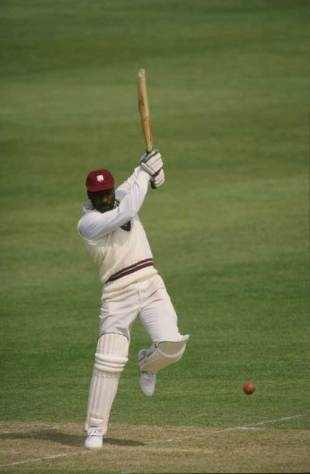Reproduced here:
Viv Richards
Emperor, empowerer
The King had the extraordinary ability of lifting the teams he played for
Scyld Berry
March 28, 2008
| | 
|
Before anyone thought of the phrase, Viv Richards walked the walk. After a suitable pause, following the applause for Gordon Greenidge or Desmond Haynes, Richards took the field like an emperor returning to his domains. Head held high, nose aquiline, jaw working his gum; the maroon cap - never, never, a helmet, for that would have been an admission of fear; and brandishing his choice of weapon, normally a Slazenger, in his right hand. Nobody has walked to the crease as Richards did. No choreographer, equipped with spotlights and sound effects, could have improved upon his natural entrance.
Nobody has batted like Viv Richards either. Sure, a few batsmen since his day have hit the ball as hard or harder, like Matthew Hayden or Adam Gilchrist. But nobody has proclaimed such a message as Richards did when he hit the ball. His batting was all power and dominance - his mental power, and the power of an awesomely muscular yet athletic 5' 10" body; and his dominance of the opposition, if not from the moment he made his grand entrance, then from the first ball, when he planted his front foot down the pitch and outside off stump and whipped it through midwicket for four. By the second ball of a Viv Richards innings, if not before, there were few teams who did not recognise that in their midst was a Master.
Richards has to rank among the half-dozen greatest cricketers of all time. It is not a matter of statistics, although his Test average of 50 was fine enough. It is a matter of what he did with his power and dominance. He not only led West Indies' domination of Test and one-day cricket in the eighties, as invincible captain in the second half of the decade or as the vice-captain, No. 3 batsman and figurehead of Clive Lloyd's side, he also empowered the teams he played for to an extent which has not been sufficiently appreciated. Ask this question about every cricketer you admire: did he leave the teams he represented stronger than when he started? Richards did so, which is why he won my vote ahead of Sir Garfield Sobers as one of the Five Wisden Cricketers of the Century. Sobers was the finer cricketer, no doubt the finest all-round cricketer ever. But Richards had the greater impact, greater even than Lloyd or Sir Frank Worrell, who were his forerunners.
What was West Indies before 1976? "Easygoing Calypso cricketers" was the stock description. In that year, mostly in Australia and England, Richards scored more runs in Tests (1710 at an average of 90) than anybody had done in a calendar year before. Andy Roberts was already knocking batsmen over, one way or another, but soon a whole platoon of fast bowlers gathered around the West Indian banner that was - though it was Lloyd's side in name and fact - held aloft by Richards. Thus were the world champions born.
He did the same for his other teams. When Richards made his first-class debut in 1971-72, the Combined Islands had just been allowed to participate in the West Indian first-class domestic tournament, the Shell Shield. Until then, any cricketer from outside Jamaica, Trinidad, Barbados and Guyana was powerless. Richards' own father was a decent player who represented Antigua but never got the opportunity to play a first-class match. When his son got going, the Combined Islands became too powerful, winning the tournament in 1980-81, and were split into the Leewards and Windwards: the outer islands became the dominant force in the Caribbean, as Worrell had predicted.
| Ask this question about every cricketer you admire: did he leave the teams he represented stronger than when he started? Richards did so, which is why he won my vote ahead of Sir Garfield Sobers as one of the Five Wisden Cricketers of the Century | |||
Richards empowered Somerset and Glamorgan too, the two counties he represented. Somerset was the Antigua of English cricket until the 1970s: a backwater. They had never won anything in their history. Led by Richards (though Brian Rose was the actual captain), they became the one-day team of their era in English cricket, the Liverpool or Manchester United, winning five trophies in five seasons. Almost single-handedly Richards won Cup finals at Lord's, striding out and making a hundred, instilling self-belief into small-town players who had never possessed it before.
Glamorgan were the same, or even worse, by the time Richards joined them in 1990 - famous only for internal bickerings and bad signings. Richards propelled them to the Sunday League title in 1993, in his final competitive season. In an innings of power and self-belief, if fading dominance, he had to ward off a young tearaway called Duncan Spencer to see Glamorgan home in their final match "after 23 seasons of often abject failure" as Wisden put it. Nobody has called the county a joke since.
It would be hyperbole to assert that Richards empowered Afro-Caribbeans everywhere. But by means of his cricket he gave those of them interested in cricket a pride and sense of responsibility - to themselves, to destiny - which they had never known before. "Emancipate yourselves from mental slavery" sang Bob Marley at the same time as Richards walked down pavilion steps and on to the field. "None but ourselves can free our minds." And Richards was the man who did exactly that.
No comments:
Post a Comment